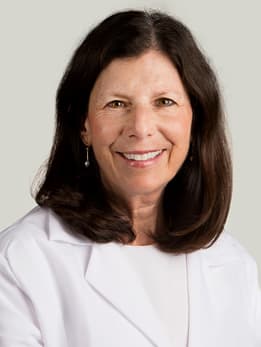Susan Cohn receives AACR-Joseph H. Burchenal Memorial Award for Outstanding Achievement in Clinical Cancer Research

Susan L. Cohn, MD, left, was awarded the 2019 AACR-Joseph H. Burchenal Memorial Award for her outstanding contributions in international pediatric clinical research.
The American Association for Cancer Research (AACR) has named Susan Cohn, MD, professor of pediatrics, chief of the Section of Pediatric Hematology/Oncology, and dean for clinical research at the University of Chicago Medicine, as the recipient of the 2019 AACR-Joseph H. Burchenal Memorial Award for her outstanding contributions in international pediatric clinical research.
Cohn is a leading authority on neuroblastoma, a cancer of peripheral nerve cells that is most commonly found in infants and children. She is recognized for her leadership in clinical trials to improve treatment and survival for neuroblastoma.
“Although we have made great progress in the treatment of pediatric cancers, only half of all children diagnosed with high-risk neuroblastoma are cured with our current strategies,” said Cohn. “When I first started my career, the survival rate for high-risk neuroblastoma was less than 30%. The advances we have made are directly due to successive cooperative group clinical trials combined with translational research studies that have led to a better understanding of tumor biology and the discovery of new therapeutic targets.
Each year, the award is granted to one cancer specialist in recognition of his or her outstanding achievements in clinical cancer research. Recipients deliver an award lecture during the AACR Annual Meeting, which takes place this year from March 29 to April 3, 2019 in Atlanta, Georgia. Cohn’s lecture, titled “Advancing Treatment Through Collaboration: A Pediatric Oncology Paradigm,” is scheduled for Tuesday, April 2, at 4 p.m.
“Her extraordinary leadership at the national and international levels, particularly in the design and conduct of pediatric oncology clinical trials, has led to significant advances in the field.”Cohn, who previously served as co-director of the Institute for Translational Medicine at the University of Chicago, is recognized for her laboratory-based work on elucidating the molecular underpinnings of clinically aggressive, high-risk neuroblastoma. She has also led international efforts to transform the way neuroblastoma is managed and identify more effective, targeted treatments.
Cohn also conducts phase I clinical trials of promising treatments for children with relapsed neuroblastoma. In April 2014, her team established the only 131I-metaiodobenzylguanidine (MIBG) treatment program in Illinois at Comer Children’s Hospital. This targeted radiotherapy has been shown to be one of the most active treatments for children with neuroblastoma that has not responded to standard therapy. Based on the high response rate observed in children with relapsed disease, 131I-MIBG is now being tested in a Children’s Oncology Group randomized phase III study in newly diagnosed children with high-risk neuroblastoma.
“Dr. Cohn has dedicated her career to improving outcomes for children with cancer,” said John M. Cunningham, MD, George M. Eisenberg Professor and chairman of pediatrics at the University of Chicago. “Her extraordinary leadership at the national and international levels, particularly in the design and conduct of pediatric oncology clinical trials, has led to significant advances in the field.”
In 2004, Cohn co-led an international coalition of pediatric cancer physicians and researchers with Dr. Andrew Pearson from the United Kingdom, the International Neuroblastoma Risk Group (INRG) Task Force, to develop a consensus approach for pretreatment risk classification of neuroblastoma, based on statistical analyses of prognostic factors in 8,800 patients. This work made it possible to directly compare clinical trial results across the globe and establish international collaborations that were crucial to understanding this relatively rare cancer type. Cohn and Pearson recognized the value of the large patient cohort and these data were made available to researchers around the world for data mining studies. Several seminal studies never before possible with smaller cohorts have been published.
More recently, Cohn has collaborated with Samuel Volchenboum, MD, PhD, MS, and the Center for Research Informatics (CRI) at the University of Chicago to build the International Neuroblastoma Risk Group (INRG) Data Commons, a cloud-based ecosystem that enables connections between clinical data and other data sets including genomic data. Currently, clinical information on over 20,000 neuroblastoma patients from around the world are housed in the INRG Data Commons and connections to several genomic databases have been established. A cohort discovery tool has been built and is available on the Chuan He, PhD, at the University of Chicago to investigate the epigenetic landscape of neuroblastoma. Her current work demonstrates that whole-genome profiles of the epigenomic mark 5-hydroxymethylcytosine differ in clinically aggressive, high-risk neuroblastoma versus tumors associated with more benign clinical behavior. Studies to evaluate this epigenomic marker in circulating cell-free DNA are ongoing.
Cohn has held leadership positions in national pediatric cooperative clinical research groups, including serving as a past-chair of the Children's Oncology Group (COG) Neuroblastoma Disease Committee and as an elected member of the COG Executive Committee and Chair of the COG Hematology/Oncology Discipline Steering Committee. She also was elected as a member of Childhood Cancer Survivor Study External Advisory Committee, American Society of Clinical Oncology (ASCO) Board of Directors, and NCI Board of Scientific Counselors.
The AACR-Joseph H. Burchenal Memorial Award was established in 1996. It was named for the late Dr. Joseph H. Burchenal, honorary member and past president of the American Association for Cancer Research, who was a pioneer in the development of chemotherapeutics for the treatment of cancer. Cohn joins more than 20 other researchers who have previously received the award for their significant contributions to clinical cancer research.

Susan L. Cohn, MD
Susan L. Cohn, MD, is a highly respected expert in pediatric cancers and blood diseases. She is a leading authority on neuroblastoma, a cancer of nerve cells, and the most common type of cancer found in infants. She serves as chief of the Section of Pediatric Hematology/Oncology.
Read Dr. Cohn's physician profile
Pediatric Cancer Care
All of our efforts are dedicated to helping kids and teens with cancer beat the disease, so they can live active, full lives.
Learn about our kid-focused cancer care